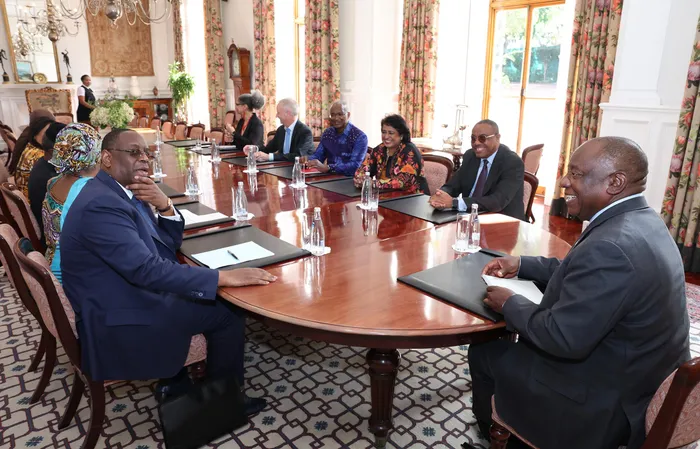G7 Summit: Will Global South Voices Be Heard?

President Cyril Ramaphosa met several former African Heads of State and Government who are championing the African Leaders Initiative on Debt Relief at his official residence, Genadendal, in Cape Town on February 25, 2025. President Ramaphosa will attend the G7 summit in Canada today. For the Global South middle powers, an important responsibility in global G7 and G20 platforms is the commitment to articulate the interests of the G77 and the majority world, says the writer.
Image: GCIS
Ashraf Patel
This year's G7 Summit takes place in Kananaskis Canada, under the theme Governance in a Fragmented World.
The world in 2025 stands at a critical juncture. Geopolitical fragmentation, systemic economic shocks and accelerating technological change are reshaping the contours of the international order.
While the values underpinning the postwar multilateral system — democracy, open markets, human rights and the rule of law — remain foundational, their global reach and efficacy face a real threat of erosion from multiple directions.
In this context, a narrative has emerged of Southern powers that can, in some way, influence the global agenda via the G20 and some presence at the G7.
Canada generally has good programs aligned with the UN SDGs and responsible middle power, but will it sway the big powers to a broader development agenda?
What, then, is the value of Southern nations participating in the G7 in the current globally fractured era amidst trade wars and conflict? The BRICS nations bloc was conceived to chart an independent pathway due to these unequal relations in the world order.
Currently, most G7 core nations are in perilous economic stagnation. The UK, Germany, France and the US face multiple crises. The US domestic situation is divided with major strife and an authoritarian turn, and today, many US cities mirror that of Global South societies.
A key question then is what is to be gained from participation at the G7 when the policy prescripts in this context is a forgone conclusion.
For President Cyril Ramaphosa, this is his 5th trip to a G7 Summit as an observer. Observer status of Global South leaders generally means they have at least a day to engage over lunch and working sessions with the G7's core leadership.
For South Africa, it’s a case of the same old dialogue. In 2020 the South African president was invited to the G20 in Gleneagles, UK. The Covid pandemic was at its peak and G7 nations and their pharmaceutical industries ensured Covid nationalism that left Africa languishing at the bottom of the pyramid. At that summit, a new Just Energy Transition (JET) program was conceived, and over the years transformed into an investment program JET IP.
While couched in terms of ‘development co-operation on climate’, upon closer scrutiny, South Africans discovered that they were green loans repayable with interest.
Even more concerning is that this year’s G7 takes place against the backdrop of regressive Development Aid policies by core EU states - UK, Germany, and Netherlands which is predicated on a ‘new development business interest paradigm’ with cuts to core development aid, and linking Development Aid directly to investment and business outcomes.
More concerning is the commitment by the EU and NATO states to increase Defence expenditure to 5% of GDP. Invariably, these structural shifts meant that the Northern world G7 would likely adopt more structural reforms, austerity and a push for neoliberalism in the Global South, meaning more extractive policies.
This can be seen by increased oil and gas explorations by G7 nations across Africa, thus contradicting their commitments to UN Climate Change COP targets. It is in these multi-layered complexities - and contradictions that Middle Powers - India, South Africa and Brazil are invited to the G7 this weekend. Realistically, prospects for a ‘new deal’ on debt, climate finance and meeting SDGs in this austerity ecosystem are low indeed.
By contrast, just this week China has removed tariffs for all 53 African states who export to China, thus boosting job creation and industrial development. In just one sweep it has done more for African trade than G7 nations communiques have done in a years. This is a concrete example of development solidarity and moves towards fair and balanced trade. By contrast, core G7 states are engaged in trade wars, tariff imposition and economic nationalism.
The G7 themes do somehow weave into the G20 just as the BRICS nation's themes on green industrial development and IFI reforms have. In terms of Southern agency and agenda setting, South Africa is generally a middle power committed to multilateralism and the UN charter, a laudable approach, but it has limitations in the current era.
For the Global South middle powers, an important responsibility in global G7 and G20 platforms is the commitment to articulate the interests of the G77 and the majority world. In the current context of Trump 2.0 trade wars and WTO ineffectiveness, geopolitical conflicts, and the lack of any agency or power by smaller nations such as Lesotho means that Low-Income Countries (LIC) are now most vulnerable and are facing ever deeper poverty as a result of trade wars and abrupt cuts in USAID etc.
The recent G77 June statement has decried that at a time of converging global crises including conflict, climate change, hunger, poverty, food insecurity, rising inequalities, declining official development assistance, and rapid technological disruption and has reaffirmed development as a fundamental pillar of peace and security.
Generally, the G7 agenda is about maintaining the hegemony of the Global North. Again, the current fractured era suggests that the Middle Powers now straddle the thin line between co-option into dominant patterns of unequal trade, finance and austerity, and Sovereignty.
What pathways will be prioritised?
* Ashraf Patel is a Senior Research Associate at the Institute for Global Dialogue, UNISA.
** The views expressed do not necessarily reflect the views of IOL, Independent Media or The African.